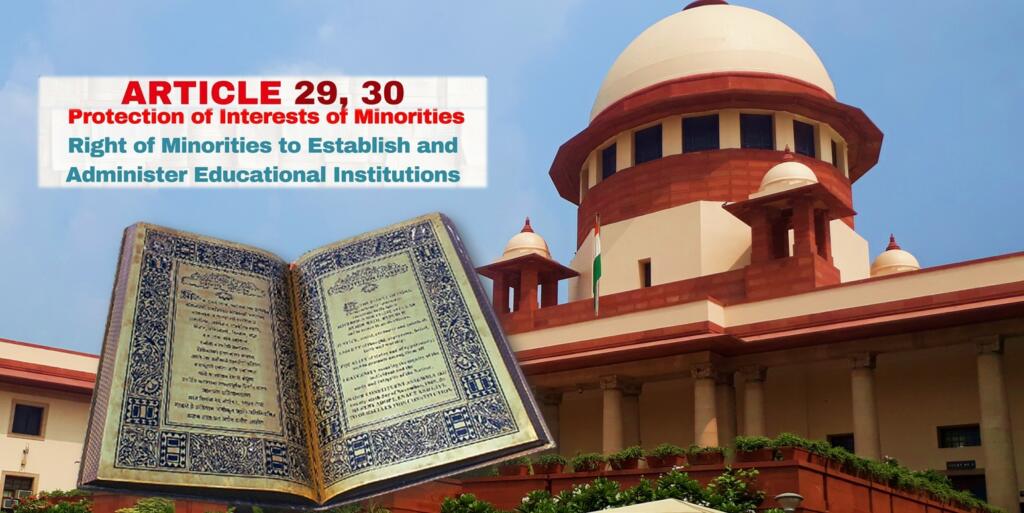Minority appeasement is the scourge affecting all of us. The phenomenon is against the idea of equality. Everybody blames politicians for that. Politicians have gone overboard; Politicians are vote-bank vultures are some common phrases. Rarely does anyone look into legal force immunising the excesses of these politicians.
Constitutional provision for minorities
When our country gained political independence, Constitution makers did not look into सर्वधर्म समभाव philosophy of Indian history. They were more fearful of the way Jews were treated in Nazi Germany. Partition horrors had worsened the psychological trauma. Resultantly, specific provisions for minorities found their way in the Constitution. Article 29 and 30 of the fundamental rights chapter accords special provisions for minority rights. Articles 38, 39 and 46 silently endorse it.
The responsibility of ensuring that these Articles are followed lies with the government. The second line of defence is Judiciary. Through a plethora of judgements, the Judiciary has interpreted the Constitution in such a way that the majority has started to feel victimised.
Apex Court’s rulings on minority rights
One of the earliest such cases was the Bombay Education Society case. In this case, the Apex Court held that Articles 29 and 30 enable minorities to impart education to their children in their own institution and in their own language. The government was barred from basic administrative issues like language of instruction.
Heck, it stands totally barred from interfering in administration of minority institutions. This was held in the Sardar Syedna Taher Saifuddin case. Despite that, the Gujarat government had taken over the management of St. Xavier’s College. The matter reached the Apex Court. In St. Xavier’s College v. State of Gujarat case, honourable Supreme Court held that doing so violated the college’s right to minority status.
“Secularism is neither anti-God. nor pro-God, it treats alike the devout, the agnostic and the atheist. It eliminates God from the matters of the state and ensures that no one shall be discriminated against on the ground of religion.” said the Court while deciding the fate of a college being run in the name of God.
These cases established that the government could not interfere in minority-led educational institutions. Then obviously such colleges must be governed by their respective University’s rules and regulations. Answer to that well-intentioned question is No.
In the 1992 case of St. Stephen’s College v. University of Delhi, the SC held that affiliation of a minority-run education institute to non-minority University does not take away its minority rights. The only checkpoint is to ensure that exercise of such rights does not harm larger national interests.
Immune from reservation
Now, let’s address the elephant in the room. Are minority-led institutions immune from reservation? The answer is yes. These institutions are free to admit anyone on the basis of merit. In P.A. Inamdar Case, the Apex Court held that policy of students to admit students is not applicable to minority students.
On the contrary, institutions that are not minority-led can’t discriminate against any child on the basis of their immutable characteristics. In other words, while majority-led institutions can’t legitimately deny admission to minorities, the minority-led can deny that to the majority.
Doesn’t that sound discriminatory against the majority? Yes, it is. Somehow, this kind of discrimination is termed as positive discrimination. The underlying assumption is that by virtue of being born in a particular community, the person is at a disadvantageous position.
Phenomenon has percolated to whole of polity
The problem is that this phenomenon is not limited to education. It percolates down to minority run religious places. In fact, we have a special act called “Place of Worship act”, which silently protects minorities’ place of worship.
With so much legal backing, why would a populist politician not ask votes in the name of a minority? Think about it. There is an atmosphere of legal immunity when you start to pitch for minority rights in public. Doing the reverse leaves you legally vulnerable and socially stigmatised. Moreover, very few delve deep into social and economic hierarchy among minority communities to gauge their actual status. Again, a lot of them fear backlash, even if they are talking about internal reform in these communities.
Minority rights is well-intentioned in letter and spirit. But, going too far on it always leaves others disenfranchised. Every right needs to be subject to larger good. Otherwise, minority rights stand at the risk of becoming minority-led tyranny.
Support TFI:
Support us to strengthen the ‘Right’ ideology of cultural nationalism by purchasing the best quality garments from TFI-STORE.COM
Also Watch:
https://www.youtube.com/watch?v=ADBnqbrm18U
